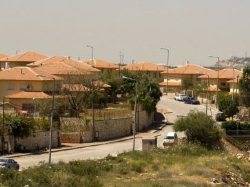A government-commissioned report has recommended that Israel legalize dozens of unsanctioned West Bank settlement outposts, a move that would defy international opposition to settling land Palestinians want for a future state.
The report, written by a committee with pro-settler sympathies, also reaffirmed Israel's longstanding position, at odds with most of the world, that the West Bank is not occupied territory and therefore Israel has the legal right to settle it.
The panel's recommendations, which include annulling past Supreme Court orders and other legal rulings in order to facilitate settlement construction, have not been endorsed by the government.
Prime Minister Benjamin Netanyahu welcomed the panel's work, saying he would bring its conclusions to a special forum he established on the matter where a decision would be taken.
If endorsed, the recommendations could give Netanyahu ammunition to support new settlement activity and fend off pressure from a Supreme Court that has ordered the government to take action against the existing outposts.
Jewish settlements are at the heart of a three-year-old impasse in Mideast peace efforts. The Palestinians say they will not resume negotiations until Israel freezes settlement construction.
Illegal outposts are unsanctioned enclaves
The illegal outposts are unsanctioned enclaves that Jewish settlers began erecting in the 1990s to sidestep Israel's commitment to stop building new settlements.
There are dozens of illegal outposts, in addition to about 120 full-fledged settlements.
More than 500,000 Israelis now live in the West Bank and East Jerusalem, areas captured by Israel in the 1967 Mideast war and claimed by the Palestinians for a future state.
The Palestinians and the international community consider the settlements illegitimate and obstacles to peace.
Palestinian spokesman Ghassan Khatib immediately denounced the report's conclusions.
"This is in complete contradiction with international law and with specific resolutions of the United Nations ... and in contradiction with the official policy of almost every single country in the world," Khatib said.
"We also think that such positions contradict the international efforts to establish peace based on two states, one of them in the territories occupied in 1967."
Netanyahu set up the committee in January to examine land use issues in the West Bank after concluding that a 2005 report on unauthorized settlement outposts was tainted by leftist bias.
The author of the report, which had been commissioned by then-Prime Minister Ariel Sharon, a staunch settlement champion, was a former state prosecutor who ran for parliament on the dovish Meretz Party's ticket after leaving the civil service.
The new committee was headed by former Supreme Court Justice Edmond Levy, who opposed Israel's 2005 Gaza Strip withdrawal.
It was considered sympathetic to setters and was expected to issue the recommendation to legalize outposts.
Although they skirted official approval procedures, government officials knew the outposts were being built and supplied them with the infrastructure hookups and military protection given to sanctioned settlements.
About 100 illegal outposts, home to several thousand Israelis, dot the West Bank, in addition to more than 120 full-fledged settlements.
The Israeli government had promised the US in 2003 to tear down two dozen outposts built a decade ago but it has never honored that commitment.
The 2005 report on outposts by Talia Sasson was sharply critical of government complicity in their construction and noted that dozens were built on Palestinian-owned land, in violation of Israeli law.
Israel's Supreme Court recently rebuffed the Netanyahu government's efforts to preserve one of the outposts, and it is due to be demolished next month.
A second outpost was evacuated this month in spite of Netanyahu's efforts to avert the settlers' eviction.
'Nothin was inherently illegal'
The report made public on Monday proposed that procedures be streamlined to legalize the outposts and allow for new settlement construction.
Committee member Alan Baker, a former legal adviser to the Foreign Ministry who is now a fellow at a conservative think-tank, said the outposts were not authorized because of international pressure and urged their approval.
"Nothing here was inherently illegal," he said.
The committee has also proposed that Israelis and Palestinians be given no more than five years to register land they say they own.
After that time, no one will be able to claim ownership, a situation that could disadvantage Palestinians unaware of their legal rights, especially those who live outside the West Bank.
The panel also recommends annulling a Supreme Court decision from 1979 forbidding the expropriation of land for "military needs" when the intent is to build settlements.
PHOTO CAPTION
A general view shows the illegal Jewish outpost of Bruchin, near the Palestinian West Bank city of Nablus in April 2012.
Al-Jazeera


 Home
Home Discover Islam
Discover Islam Quran Recitations
Quran Recitations Lectures
Lectures
 Fatwa
Fatwa Articles
Articles Fiqh
Fiqh E-Books
E-Books Boys & Girls
Boys & Girls  Hajj Rulings
Hajj Rulings Hajj Fatwas
Hajj Fatwas














